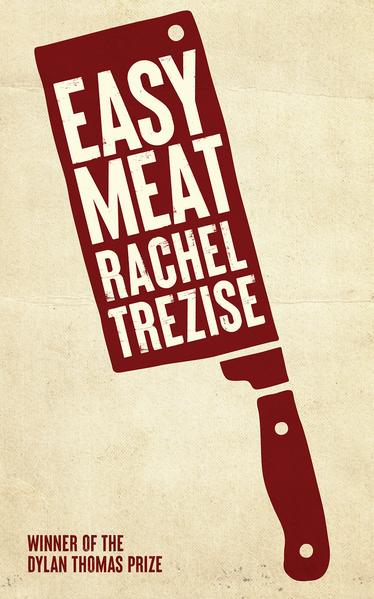Martha O’Brien reviews Easy Meat by Rachel Trezise, a novel set in the south Wales valleys which takes us back five years to the time of the EU referendum.
23rd June 2016 is a date now etched into the collective British consciousness as the day that Britain voted to leave the European Union. For the protagonist of Rachel Trezise’s latest novel, Caleb Jenkins, former reality TV star and Iron Man champion, however, it’s just another day at the slaughterhouse. Easy Meat is a novel set on a tipping point, where Brexit is only a buzzword, conspiracy theories are rife, and Caleb is desperately trying to get his life back on track.
The critical moment in this novel is not, however, a matter of ticking a box; in fact, it’s the last thing on Caleb’s mind. Brexit in this novel is a signifier of political change onto which private anxieties are projected. Easy Meat is typical of Trezise’s work in its unflinching look at poverty; Caleb has fallen from grace, haunted by his past fame and a relationship that has left him traumatized. Living with his parents after his father’s business has gone bust, taking turns sleeping on a single mattress bed with his conspiracy theorist, cannabis addicted brother, Caleb is searching desperately for anything that might offer a way out.

The fact of Wales’ voting Leave in the 2016 referendum is one that has been framed on many occasions as a foolish decision: the south Wales valleys were well subsidised by EU grants, forcing many to question Welsh people’s motivation in their choice. Trezise demonstrates the lived reality of these grants, however, which, while making aesthetic improvement to the areas, made little meaningful change. One conversation in the slaughterhouse canteen on break leads to comment on the simultaneous erection of statues and removal of public toilets: ‘What do they want us to do? Piss in the dragon’s mouth?’. This is one of countless instances in Easy Meat that force the reader to place themselves once more in 2016; to question how often they thought about the role of the European Union, or its direct impact on their everyday life; to wonder how issues like freedom of movement spoke to individuals in poverty who could barely make money for bus change.
Caleb is surrounded by messages that suggest multiculturalism and immigration are the causes of poverty. Though an outsider among immigrants in the workplace, he shares in the same struggle as his colleagues: overcrowding, precarity and high demand for working hours demonstrates that British poverty is indiscriminate between natives and immigrants. It is figures of authority, like Morris, the supervisor at the slaughterhouse, that work to increase division. Images like that of Caleb helping his Latvian work colleague, Mykolas, carry a cowhide across the slaughterhouse support the notion that messages of nationalist struggle pushed by the Leave campaign serve to distract from the more pressing class struggle that unites the slaughterhouse workers.
Politics, immigration and the economic crash set the stage for Caleb’s deeper concerns. Intrusive memories interrupt the day of the 23rd, taking Caleb back to a time before his own downfall. The change Caleb craves within his life is a return to better times; his fixation on his physical health is a manifestation of his desire to regain control, respect — to take back what is his. He is under the grip of authority in the workplace, weak, unable to make decisions about his own life and working hours. Caleb’s class position and his nostalgia for past success are a poignant reminder of the ways in which both camps in the 2016 referendum preyed on rhetoric of existing class struggle in different ways; reading Easy Meat in 2021, the devastating reality that working-class people in Wales and the entire United Kingdom have not seen tangible improvements in their lives makes hindsight painful.
Of course, this wouldn’t be a Trezise novel without its own soundtrack. Music punctuates the narrative of Easy Meat: from CDs in the car stereo to chart-toppers over the radio between news bulletins. Music acts as a way for Caleb to escape, just briefly, singing along to familiar tunes in moments of mental distress. While some of these songs, like Tom Petty’s ‘I Won’t Back Down’, act as motivational mantras, others, like Rihanna’s ‘We Found Love’ serve as ironic reminders for the love lost in Caleb’s life. Music here evokes nostalgia in Caleb, while news bulletins take the reader back five years. Headlines like the murder of Jo Cox — a politically motivated killing of an MP that advocated that we have ‘more in common than that which divides us’ — highlight how little this tragedy seems to have punctuated the British collective memory. Our fragmented society and the impossibly quick turnover of the global newsroom seemed, often, to make political decisions inconsequential to the average citizen — a notion that the overwhelming reference to Brexit in the news since 2016 has forced us to reconsider.
Easy Meat is a novel that orbits Brexit, but in the same way that the referendum came to symbolise more than leaving the European Union, it is not about it. Though Easy Meat does not offer a concrete conclusion to the answer of why Wales voted to leave the European Union — not everyone who voted Leave did so in ignorance, or as a frustrated response to their own life struggle — it spotlights the ways in which, for many, the Brexit vote was a distraction from more real, pressing issues at hand. This is a novel about grief, poverty, and how the disparate struggles of individuals in a society can impact that society in dramatic ways.
Easy Meat by Rachel Trezise is due to be published by Parthian in June 2021.
Martha O’Brien is a current PhD candidate at Cardiff University and the University of Bristol, and is a regular contributor to Wales Arts Review.



 Enjoyed this article? Support our writers directly by buying them a coffee and clicking this link.
Enjoyed this article? Support our writers directly by buying them a coffee and clicking this link.







